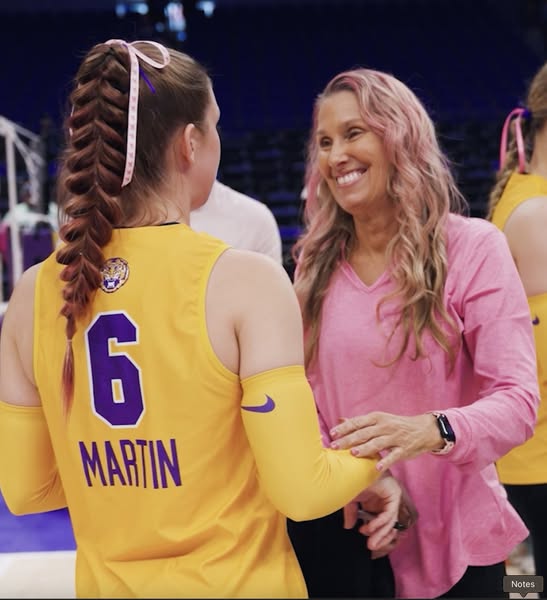As the graduation anthem echoed across the auditorium, and families clutched bouquets and camera phones with trembling hands, a figure in a royal-blue gown slowly walked across the stage—head high, eyes glistening. For Madison Martin, this wasn’t just a walk to receive her college diploma. It was a walk through fire, a symbolic culmination of a decade-long journey marked by unwavering love, familial sacrifice, and a bond tested—and forged—by adversity.
A Mother’s Diagnosis That Changed Everything
Ten years ago, Madison’s world shattered in the most unexpected way. Her mother, Tamara Martin, a single parent and a former nurse, was diagnosed with multiple sclerosis (MS), a progressive neurological disease that affects the brain and spinal cord. Tamara had always been the rock of the Martin household—working two jobs to support Madison and her younger brother, Marcus, while never missing a parent-teacher conference or basketball game.
The diagnosis was both swift and cruel. One moment she was leading her shift at the local hospital; the next, she was battling fatigue, muscle spasms, and the terrifying uncertainty of her own body turning against her. Doctors gave Tamara a grim prognosis: her mobility would decline rapidly, and she would need full-time care within the next few years.
Madison was just 13.
While many teens her age were exploring high school, first dates, and Snapchat filters, Madison’s nights were spent helping her mother bathe, preparing family dinners, monitoring medications, and eventually, learning how to administer injections. She became more than a daughter. She became a caregiver.
A Teenager’s Double Life
From the outside, Madison appeared to be a normal student. At school, she was focused, friendly, and even earned a reputation for her unwavering discipline. But few knew the emotional weight she carried home each day.
“People thought I was just quiet,” Madison recalled. “But the truth is, I was exhausted. There were nights I didn’t sleep at all because Mom would be in pain or afraid. I had to be strong because she couldn’t afford to see me break.”
The weight was almost too much to bear. Madison nearly dropped out of high school during her sophomore year after her mother suffered a medical episode that left her temporarily unable to speak or feed herself.
“I remember staying up all night Googling feeding techniques,” she said. “We didn’t have money for a nurse. It was me or no one.”
But giving up wasn’t in the Martin DNA.
Tamara, despite her decline, made it her mission to empower her daughter.
“She would write me notes, even when she couldn’t speak,” Madison said. “Things like, ‘You were born for more’ and ‘Don’t give up on your dreams because of me.’ She never let me forget that I was more than my circumstances.”
The Turning Point
Madison found solace in books. Even as her home life became more demanding, her academic ambitions never waned. She dreamed of becoming a social worker—someone who could help families like hers navigate trauma, disability, and poverty.
At 17, Madison was accepted into a local community college and later transferred to a state university with a full scholarship. But even in college, her dual life continued. On weekends, she’d take the bus home to care for Tamara, do household chores, and ensure her younger brother got to football practice.
She took night classes, worked two part-time jobs to send money home, and often wrote essays on the hospital floor while her mother underwent treatments.
There were moments of breaking.
“I remember once collapsing in the library and crying for an hour,” Madison said. “I just kept thinking, ‘Why me?’ Why did my mother have to get sick? Why couldn’t I just be a normal college student?’”
But somehow, Madison kept going.
Through scholarships, community support, and moments of grace, she managed to navigate each semester. Her professors, once unaware of her situation, rallied around her. A local church provided part-time homecare services for Tamara. A neighbor taught Marcus to cook simple meals. The village came through.
Graduation Day
When Madison’s name was called during the spring commencement, the auditorium erupted—not just from her family, but from dozens who knew her story. Her professors, classmates, neighbors, and even the dean rose to their feet in thunderous applause.
But one pair of eyes, brimming with tears, stood out among the sea.
Tamara, sitting in a wheelchair in the front row, dressed in a simple but elegant lavender blouse, had insisted on being there. Her condition had worsened in recent years, and she now required around-the-clock care. Still, she willed herself to be present—to see the culmination of their shared struggle.
“She told me she prayed every day to live long enough to see me graduate,” Madison said, wiping her tears. “That was her dream, just as much as it was mine.”
As Madison walked off the stage, she didn’t rush to her friends or pose for selfies. She went straight to her mother.
Bending down, she whispered, “We did it, Mom. We did it.”
Tamara, now speaking only in whispers, replied, “I never doubted you. Not once.”
A Future Built on Compassion
Madison plans to use her degree in social work to advocate for caregivers and low-income families living with chronic illness. Her dream is to start a nonprofit named after her mother—The Tamara Foundation—that provides home health support and scholarships for young caregivers balancing school and caretaking duties.
“There are so many kids out there like me, who are invisible,” she said. “They’re failing classes not because they’re lazy, but because they’re tired. They’re working jobs, changing bandages, cooking dinners, and trying to study in between. I want them to know they’re not alone.”
Her voice wavers, but her resolve is fierce.
“I don’t want pity. I want change.”
The Power of Resilience
The Martin story is not one of tragedy—it is one of resilience. It’s a reminder that behind every graduate crossing the stage are stories that textbooks cannot capture: silent battles, whispered prayers, and the invisible labor of love.
Tamara may no longer have the physical strength she once did, but in every way that matters, she stood tall that day.
As Madison reflected on the journey, she smiled, “We never had much, but we had each other. That love—that’s what got us here.”
Community Reactions
The story of Madison and Tamara Martin has since gone viral on social media. A photo of the two embracing post-graduation, captured by a fellow student, has been shared more than 500,000 times. Comments have poured in from around the world.
One user wrote, “As someone with a disabled parent, I felt every word of this. Madison is a hero.”
Another commented, “Can someone get this woman a book deal? Her story needs to be heard.”
Even the university president, Dr. Alan Fisher, took to the podium that day to honor Madison.
“She represents the best of us,” he said. “Her perseverance, her commitment to her family, and her passion for service are a beacon of hope in a world that often overlooks the quiet heroes among us.”
Looking Ahead
Now that she’s a graduate, Madison is taking a short break before starting her master’s degree in clinical social work. In the meantime, she’s focused on ensuring her mother receives the care she needs and is helping her brother apply for college.
When asked what advice she’d give to others in her situation, Madison doesn’t hesitate.
“Be kind to yourself,” she said. “Ask for help. And never think that your dreams have an expiration date. You’re stronger than you know.”
Final Thoughts
In a world that often glorifies overnight success, Madison Martin’s story is a powerful counter-narrative. It speaks to the beauty of long roads, the grace found in hardship, and the sacred, unbreakable bond between a mother and daughter.


